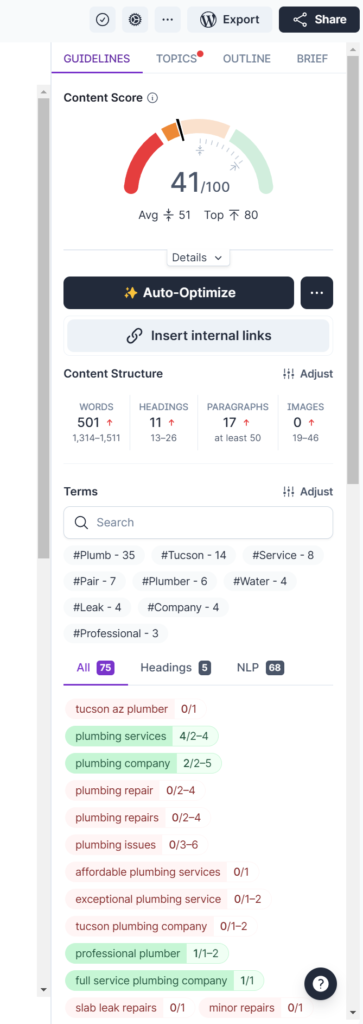Entity-based SEO goes beyond chasing keywords—it’s about optimizing for the ideas and concepts those keywords represent.
By focusing on entities, search engines can better understand the meaning behind your content, not just the words on the page. For local businesses, this means creating a stronger connection between what you offer and what your community is searching for. It’s a way to make sure search engines see your business as relevant, reliable, and ready to help.
In this article, we’ll explore how entity-based SEO works and why it’s such a powerful strategy for local businesses. Whether you’re new to the concept or looking to refine your approach, this guide will help you make sense of the entity-driven side of SEO.
What Are Entities in SEO?
Entities in SEO are the building blocks of search engines’ understanding of topics and concepts. Unlike keywords, which are specific phrases users type into search bars, such as “plumber near me,” entities are the words and ideas related to that keyword, like “pipes,” “leaks,” “toilet,” or “bathroom repairs.” Entities provide context and help search engines connect related concepts to deliver results that are more relevant to the user’s intent.
For example, when someone searches for “plumber near me,” Google doesn’t just look for that exact phrase repeated on a webpage. Instead, it evaluates the presence of related entities, such as services a plumber provides, tools they use, or the types of problems they fix. By incorporating entity terms like “home repairs,” “water damage,” or “pipe fittings” into your website content, you help search engines understand that your page is highly relevant to plumbing and home repair services.
Entities are crucial in ranking because they allow search engines to go beyond simple keyword matching. Search engines like Google use these terms to create a richer, more connected understanding of what your page is about. For example, a plumber’s website that includes references to specific local landmarks, neighborhoods, and commonly searched services can help the business stand out in local search results.
To rank effectively, your content needs to reflect not only the primary keywords but also a network of entity-related terms. This can be achieved by writing naturally about the broader context of your services or products, adding structured data, and providing detailed, useful information that aligns with common user questions. When done well, this strategy increases your page’s relevance and visibility in both general and local searches. Embracing entities in your SEO approach is like speaking Google’s language, helping it connect your business with the right audience.
The Differences Between Entities and Keywords
Entities and keywords may seem similar, but there is a distinction between the two. Keywords are the exact phrases people type into search engines, such as “best coffee shop near me.” They are often specific and literal, focusing on what users are explicitly searching for. These are typically the types of terms you’ll find when doing local keyword research because it’s what people are searching for in search engines.
Entities, on the other hand, represent concepts, ideas, or objects related to those keywords. For example, in the context of the keyword “coffee shop,” entities might include terms like “espresso,” “barista,” “roastery,” or “latte art.”
While keywords help search engines understand what a user is looking for, entities provide the broader context that makes results more relevant. Search engines use entities to identify relationships and connections between topics. For example, Google might recognize that a page about “espresso” is also relevant to “coffee culture” or “coffee machines,”. This allows search engines to go beyond matching exact keywords and offer richer, more meaningful search results.
Another difference is how these elements are used in optimization. Keywords are often the foundation of SEO strategies, guiding content creation around specific queries. Entities, however, require a deeper understanding of the topic and how related concepts interact. For instance, while a keyword-focused strategy might repeat “best coffee shop” throughout the content, an entity-focused approach would naturally incorporate related terms and topics, creating more comprehensive and authoritative content.
Incorporating entities into your SEO strategy helps you align with how search engines like Google process and understand information. Keywords remain important, but entities offer a way to enrich your content with context and depth, making it more useful for both search engines and users. By balancing these two elements, you can improve your rankings and deliver more meaningful results to your audience.
Benefits of Incorporating Entities in Local SEO
Incorporating entities into your local SEO strategy significantly enhances your website’s relevance to local searches. Entities signal proximity and context to search engines, helping them understand not just what your business does, but where it operates and how it connects to the local community.
This approach also improves the user experience by delivering results that are contextually relevant to their needs. When search engines can better interpret the relationship between your business and the local entities it mentions, users are presented with results that feel more accurate and tailored. Instead of generic suggestions, they find businesses and services that genuinely match their queries and preferences.
By weaving entities into your content naturally and strategically, you create a digital footprint that aligns with how search engines think and how users search. It’s a win-win: search engines understand your business better, and your audience finds you faster.
Using On-Page Optimization Tools to Find & Incorporate Entities
Even if you’re an expert in your industry, it can be challenging to think of all the terms and concepts related to the topic of your webpage. This is where local on-page optimization tools can make a huge difference. Tools like SurferSEO, Frase.io, and ScaleNut are specifically designed to identify related entities that you might not have considered. They analyze top-ranking pages for your target keyword and extract the terms and topics commonly associated with them, giving you a roadmap for optimizing your content.
By using one of these tools, you can ensure your content is more comprehensive and aligned with what search engines expect for your chosen topic. For example, if you’re writing about “plumbers in Kansas City,” an on-page optimization tool might suggest including terms like “pipe fittings,” “leak repair,” or “water heater installation.” These are entities that search engines associate with the topic and help build a richer context for your content.
What makes these tools especially valuable is their ability to help bridge the gap between expert knowledge and search engine expectations. Even if you know your industry inside and out, search engines may prioritize certain terms or concepts that aren’t obvious to you. By following the recommendations from these tools, you’re not only optimizing for users but also signaling to search engines that your content is authoritative and relevant.
Incorporating related entities doesn’t mean stuffing your content with terms—it’s about weaving them naturally into your writing. These tools can also help you maintain a balance, ensuring you provide enough depth without overloading your page. Whether you’re just starting with SEO or looking to fine-tune your strategy, leveraging on-page optimization tools is a practical way to enhance your content’s performance.

Final Thoughts on Entity Optimization in Local SEO
Entity optimization might sound like a complex or intimidating concept, but it’s really just a natural way of how search engines—and users—understand content. At its core, it’s about ensuring your page fully addresses its topic by including related terms and concepts that make your content more comprehensive. While traditional SEO focuses heavily on keywords, entities expand the scope to include the broader context that search engines like Google now expect.
These entities create a complete picture, making your page more valuable and authoritative. They’re not some obscure SEO trick—they’re simply what you’d naturally expect to see in well-rounded content about any topic.
By embracing entity optimization, you’re not just catering to search engine algorithms—you’re also enhancing the user experience by covering all the angles they care about. So while the term might seem technical, it’s really just a way of saying: “Write thoroughly, think contextually, and connect the dots.” When you do, Google—and your audience—will take notice.


